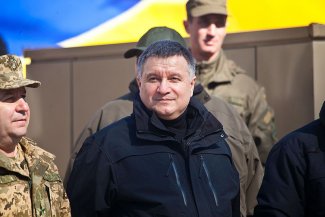Ukraine: resignation of Avakov, the "eternal" minister

On 15 July, by a majority of 291 votes, Ukraine's Verkhovna Rada dismissed Interior Minister Arsen Avakov from his post, acceding to a motion he had submitted two days earlier. His successor will be Denys Monastyrsky, chairman of the parliamentary committee on law enforcement, which deals with issues of the reform of the Ministry of Internal Affairs. His candidacy was put forward by President Volodymyr Zelensky who was supported in this by his parliamentary grouping. Avakov has served as head of the Ministry of Internal Affairs continuously since 2014. During that time, he oversaw the activities of the police and the National Guard. He was a flexible minister, skilfully using his ministry to strengthen his own position in the government, but he was not popular with the public and was constantly criticised for lapses in the leadership of the Ministry of Internal Affairs.
Commentary
- Avakov's departure will be significant in terms of strengthening the influence of the Office of the President in the Ministry of Internal Affairs. His departure indicates that Zelensky has decided that keeping him in the government is no longer necessary, and that his removal will not meet with much resistance from the power elites. Monastyrsky, the newly designated minister, is not connected to the ministry and has no experience in heading a large state institution. Nor is he a politician with charisma who harbours independent political ambitions. Support for his candidacy proves the president's belief in his loyalty and availability.
- Taking control over the Ministry of Internal Affairs is a success for Zelensky and completes the process of monopolising supervision over security departments by his administration (the only institution whose head is not informally subordinated to the Office of the President is the National Anti-Corruption Bureau of Ukraine). It should be expected that the work of the department will be significantly influenced by Oleh Tatarov, who has led the Office of the President from August 2020 and is a long-term official of the Ministry of Internal Affairs responsible for supervision of the law enforcement agencies (including the Ministry of Internal Affairs, courts, prosecutor's office). He is a controversial figure. In 2011-2014, during the presidency of Viktor Yanukovych, he worked in the Investigation Department of the Ministry of Internal Affairs and conducted proceedings against social activists, for which – after the victory of the Revolution of Dignity – he was dismissed from service. His assumption of the post in the Office of the President signals the personnel problems faced by Zelensky's team as they are forced to use the professional experience of a discredited official.
- Avakov in 2019 supported Zelensky in the election campaign. At that time, he ensured the neutrality of the bodies of the Ministry of Internal Affairs and the peaceful conduct of the election. However, his good relations with the president did not guarantee that he would maintain a strong political position. Zelensky's circle sought to weaken Avakov’s influence or to dismiss him, but this was approached with caution, in part due to fears that the Ministry of Interior controlled militia organisations (such as the National Corps) could help him influence the dynamics of protests against the president. After a temporary "truce," the president’s camp began intensifying its criticism of Avakov in 2020. Authorities under his leadership have been accused of mishandling the investigation of the murder of journalist Pavel Sheremet, as well as publicising irregularities in the work of the police and signs of their criminalisation, and of halting reforms aimed at improving personnel policy. At the end of May, Zelensky said that the lack of progress in Sheremet’s case and the prosecution of those whose involvement in the murder is questionable could lead to Avakov's imminent dismissal.
- Most likely, Avakov will try to return to the political scene after a short period in the political wilderness, although it will not be easy. He does not have his own political base and, most importantly, he is not popular with the public (polls show that his activity is assessed negatively by approximately 70% of Ukrainians).




